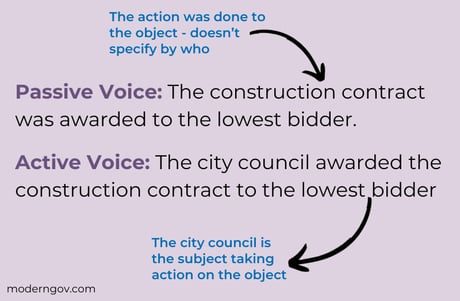What are the Essential Writing Skills for Public Sector Professionals?
 Chloe Martin
·
4 minute read
Chloe Martin
·
4 minute read
As a public sector professional, your writing skills are crucial, even if your job isn't writing-focused.
Understanding and developing essential writing skills can change the way you interact with colleagues, engage service users and improve service delivery overall.
In this blog post, we'll cover the essential writing skills public sector professionals need and exactly how to develop them.
Contents:
- Uses for Strong Writing Skills in the Public Sector
- Essential Writing Skills for Public Sector Professionals
- How to Develop Your Writing Skills
Uses for Strong Writing Skills in the Public Sector
Writing plays a big role in many public sector roles. Here are several tasks that require strong written skills:
- Reports
- Policy documents
- Emails
- Internal or external communications
- Stakeholder communications
- Website updates
- Briefings and submissions
- Bids and tenders
- Contract documents
Each of the above requires different skills and writing styles, but with practice, you'll be capable of producing succinct and effective writing. By learning advanced skills and techniques, you can dramatically improve your written communication skills and gain confidence in your abilities.
7 Essential Writing Skills for Public Sector Professionals
1. Communicating Complex Information Simply
Statistics, jargon and complex insights are everywhere these days. But how do we use our writing skills to tell this information in a way that everyone can understand?
- Avoid using confusing jargon and overloading on acronyms
- Use simple and clear language
- Use short sentences
- Keep your target audience in mind. Ask a colleague who works on different topics to read your writing - do they understand? Are the main points clear enough to understand?
- Engage the reader with storytelling - wrap statistics or facts in stories so they're easy to understand
Read our simple guide on how to present complex information.
2. Proofing and Editing
Every writer needs to be able to proof and edit their own work, especially if there's not always a team member on hand to give it a second look. If a piece of copy doesn't add anything or doesn't tell the reader more about what they're after, cut it out.
3. Using Active Voice
The active voice refers to phrases where the subject performs the action (verb) on an object. Whereas, in the passive voice, the verb acts upon the subject instead. The active voice is known for being more clear, direct and to the point, which can create more impact - especially if you want the reader to take action after reading.
Here are three examples to demonstrate the difference between the active and passive voice:
1. Passive Voice: The new budget proposal was approved by the committee.
Active Voice: The committee approved the new budget proposal.
2. Passive Voice: The new policy to address unemployment was passed by the government.
Active Voice: The government passed a new policy to address unemployment.
3. Passive Voice: The construction contract was awarded to the lowest bidder.
Active Voice: The city council awarded the construction contract to the lowest bidder.
See how much easier the active voice is to read? If you feel yourself stumbling on specific parts of your writing, take a closer look and see if you're using the passive voice.
4. Facts Over Opinion
In the public sector, facts are often preferred over opinion. Holding structured debates can be useful, but you always need to have research or statistics to back up your points - why wouldn't you do the same in your writing?
Readers and colleagues are much more likely to trust and believe in your work if you've taken the time to research facts that back up your opinions. If you feel the need to use the first person in your copy, have to think about if your ideal reader really wants to hear from you or your company personally. If not, remove it.
5. Get Straight to the Point
Your reader should be able to quickly see the main points of a piece of text.
It's easy to get caught up with unnecessary context and details, but try to remember what your audience wants to gain out of reading your writing. Do they need the context to understand? Or is it something only you think is necessary?
By going straight to the point, you can build on why the reader should care about the topic at hand. Overwhelming them with details can dull their interest and even make them stop reading altogether. Be concise and use plain language where possible.
6. Show Clear Solutions and Actions
Whether you're explaining to the reader how to do something or you're presenting new information many of your listeners wouldn't have heard before. Make solutions or next steps clear to help them understand where to go for more information and what to do with it.
Sometimes there isn't a clear solution just yet, and in these cases, explain why there isn't. No one likes to be left hanging!
7. Using Grammar Correctly
This may seem basic, but grammar can have a major impact on the entire meaning of sentences and paragraphs. It can get confusing with apostrophes, hyphens, colons, and other punctuation marks out there, but it's important to understand the implications of bad grammar - not just on your reader, but you or your organisation.
To give you an example (a classic)...
There's a different meaning between these two phrases: “Let's eat grandma” and “Let's eat, grandma.” Pretty bad right? If you're ever unsure, use writing software such as Grammarly to avoid those potentially damaging simple mistakes.
How Do I Develop Those Skills?
At Understanding ModernGov, we work with our Communications Trainer, Sue Calthorpe, to deliver a whole range of writing courses from producing briefs and submissions for government officials; to compiling business cases and bids and writing more effective reports.
Taking a written communications course is a great way to expand your writing skills, receive effective feedback and communicate with your reader more easily. As an example, see what you will learn in a report writing course.
See What Other Public Sector Professionals Have Said
"I found the course entirely relevant and focused on the objective. The material was excellent, and the course well-paced and delivered with clarity" - Category Manager, Loughborough University
"Sue was a great trainer and really kept me engaged. Constructive and helpful, will definitely recommend" - Senior Commissioning Officer, Essex County Council
"Engaging, enjoyable and evidence-based. A terrific course" - Communication Manager, ABHI
How Do I Attend a Writing Course?
Whether you want to improve your minute-taking skills or learn how to write more effective briefs, we've got a range of upcoming courses that can take your writing skills to the next level. Book your place today
2+ years in SEO and content marketing. Striving to help public sector professionals develop their skills and learn something new through high-quality content.








